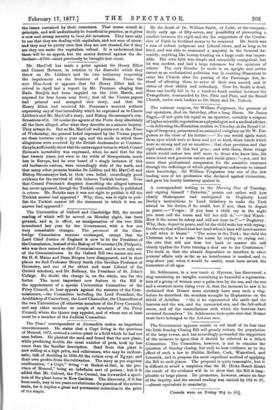The Times' correspondent at Alexandria makes an important announcement. He
states that a Copt living in the province of Menouf, 1873, noticed a cotton-plant in a field which he had not seen before. He planted the seed, and found that the new plant, while producing double the usual number of pods, took up less room than the familiar description. Seed from this plant is now selling at a high price, and cultivators, who may be enthusi- astic, talk of doubling in 1880-82 the cotton crop of Egypt, and their own profits from the cultivation. The story as yet requires confirmation, "a Copt," living "at Berket-el-Sab, in the pro- vince of Menouf," being an indefinite sort of person ; but it is added that Mr. Calvert, the Vice-Consul, has forwarded a speci- men of the plant home to Kew Gardens. The discovery, if it has been made, may in ten years revolutionise the position of the cotton trade, for it implies a great and permanent redaction in the price of the staple.
By the death of Dr. William Smith, of Leith, at the compara- tively early age of fifty-seven, any possibility of preventing a conflict between the rigid and the lax supporters of the Confes- sion of Faith in Scotland seems to be removed. Dr. Smith was a man of robust judgment and Liberal views, and so long as he lived, and was able to command a majority in the General As- sembly, anything like heresy-hunting on a large scale was impos- sible. His own faith was simple and essentially evangelical, but he was modest, and had a large tolerance for the opinions of others: The only blunder he made in an upright and active career as an ecclesiastical politician was in courting Dissenters to enter the Church after the passing of the Patronage Act, in- stead of allowing them to enter of their own accord, and in virtue of their ability and orthodoxy. Now Dr. Smith is dead, there can hardly fail to be a hand-to-hand combat between the Evangelicals, commanded by Drs. Pine and Phin, and the Broad Church, under such leaders as Dr. Story and Dr. Tulloch.


































 Previous page
Previous page